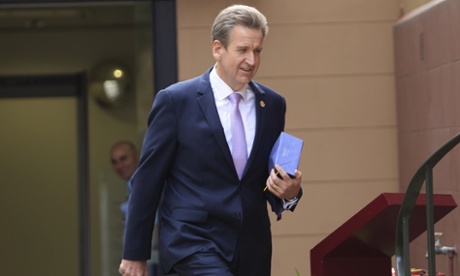It's high time for a national corruption commission
For
federal party leaders looking to demonstrate their support for clean
politics, the place to start is by backing an Australian Greens bill for
a national Icac
federal party leaders looking to demonstrate their support for clean
politics, the place to start is by backing an Australian Greens bill for
a national Icac

Premier Barry O’Farrell’s resignation was supposed to
indicate a break between the old-style way of doing politics in NSW and the
state Liberal Party, but it has emerged that new premier Mike Baird appointed
the lobbyist at the heart of the current scandal, Nick Di Girolomo, the chief
executive of Australian Water Holdings, to the state water board.
However, recent events in NSW parliament have little to do with a bottle of wine, Barry
O’Farrell’s poor memory, or even Australian Water Holdings. They are about an
issue that goes right to the heart of our political system – the links between
our major political parties and the big end of town. The NSW Labor culture of lobbying has well and truly spread to the NSW
Coalition and to federal parliament – could revelations involving Liberal senator
Arthur Sinodinos and the relationship between NSW Liberals and Australian Water
Holdings be the tip of the iceberg?
At the federal level, very little has been done to combat influence peddling in
politics. Governments write their own ministerial codes of conduct. There are
no real consequences for failing to update the registers of senators’ and
members’ interests, and we have seen many examples of MPs forgetting about
their obligations.
Lobbyists are barely regulated,
spending on political advertising is unlimited and both the government and
opposition have opposed attempts to establish a
national lobbyists’ watchdog. Although parties are required to declare
donations, there are few restrictions on who they can take money from.
In NSW, donations from developers and tobacco,
gambling and alcohol companies are banned, and for other corporations capped at
just over $5,000 per annum. But despite growing public cynicism about
the influence of corporate political donations, the Coalition and Labor parties
have stuck together to block any federal reforms. Donations from corporate
interests to both Labor and the Coalition run to many millions of dollars at
every election.
The Australian Greens currently have a bill for a
national Icac that is
before the federal parliament. Such a body is urgently needed to shine a
light on any situations where relationships between big
business and major party politicians go further than just political
donations into the realm of corruption in order to restore people’s
confidence in the
political system.
Like the NSW Icac, its powers must be
broad. It should be empowered to investigate and expose allegations of corruption
throughout the public sector, not just among ministers. This could include
public agencies and departments, the courts, public officials, and all MPs.
A federal ban on
corporate donations to political parties is also a must. This is one way we can
put the brakes on activities many in the community consider unethical.
It is a shame, but
telling, that earlier this year the Coalition government and Labor opposition
joined forces in the Senate to vote down a Greens motion backing greater
regulation of lobbying activities in the federal parliament.
Prime minister Tony
Abbott will attempt to isolate himself and the federal coalition from premier
O’Farrell’s resignation. The only way to get to the bottom of this is if
the Coalition and Labor get behind the Greens proposal for a federal corruption
commission.

No comments:
Post a Comment